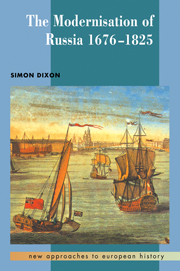7 - Ideology
Published online by Cambridge University Press: 05 June 2012
Summary
It seemed obvious to nineteenth-century intellectuals obsessed with Hegel that the state had been the driving force of Russian history. Not all of them thought its role had been beneficial: some were sure that it was malign whilst others, like Pushkin in The Bronze Horseman (1833), were uncomfortably ambivalent, admiring the state's awesome achievements but dismayed by their social costs. Still, whether they idolised or execrated the state, few hesitated to ascribe to it the dominant rôle. So, having already discussed the state's institutional apparatus, now we must probe its ideological foundations.
This chapter approaches the subject from three angles. First, it shows that, just as the monarch continued to play a central rôle in government, so traditional notions of personal rulership continued to coexist alongside abstract conceptualisations of the state until after 1825; secondly, it shows that this duality delayed the emergence in Russia of a political nation self-consciously opposed to the state and its ruling dynasty; finally, it suggests that, in the absence of coherent opposition, the greatest weakness in tsarist rule lay in the alienation of what might have been its firmest bastion of ideological support, the Russian Orthodox church.
Tsar and state
The period between c. 1350 and 1700 marked a crucial transition in Western political thought, for it was then that the dominant modern notion of the state emerged.
- Type
- Chapter
- Information
- The Modernisation of Russia, 1676–1825 , pp. 189 - 220Publisher: Cambridge University PressPrint publication year: 1999

